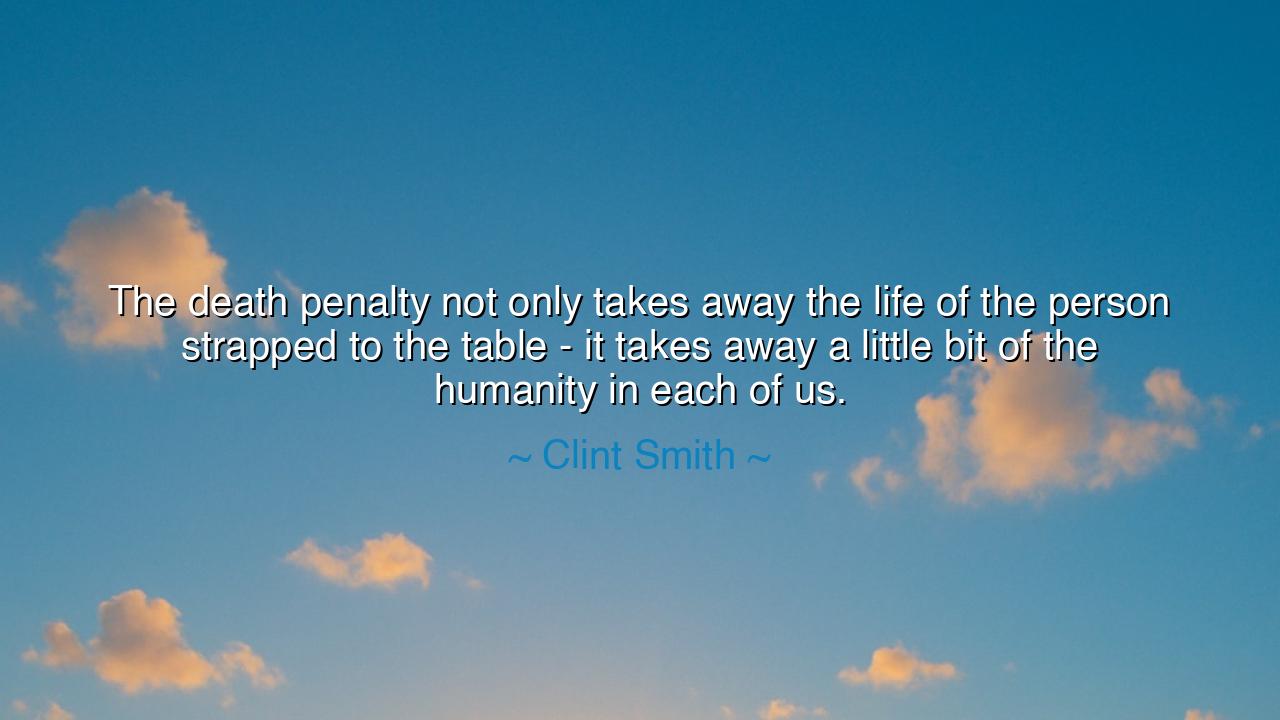
The death penalty not only takes away the life of the person
The death penalty not only takes away the life of the person strapped to the table - it takes away a little bit of the humanity in each of us.






“The death penalty not only takes away the life of the person strapped to the table—it takes away a little bit of the humanity in each of us.” Thus speaks Clint Smith, a poet, scholar, and moral voice of our age, whose words pierce like an arrow through the veil of indifference. In this single sentence, he calls forth the ancient question of justice, mercy, and the sacred worth of human life. His message burns with quiet conviction: that in killing, even under the banner of law, society wounds itself; in extinguishing another’s light, it dims its own. For he understands, as the wisest of every age have known, that violence sanctioned by the righteous still stains the soul of those who commit it.
The origin of this quote lies in Smith’s reflections on the criminal justice system, particularly the moral weight of capital punishment. In his essays and poetry—works such as Counting Descent and How the Word Is Passed—he often meditates on how history’s injustices echo into the present. When he condemns the death penalty, he does not do so from sentimentality, but from historical and ethical truth. He sees it as a remnant of vengeance disguised as virtue, an act that pretends to purify society by bloodshed, yet instead corrodes its spirit. To him, the ritual of execution is not justice fulfilled—it is humanity diminished, a performance that numbs compassion and deepens our separation from the divine.
When Smith says that the death penalty “takes away a little bit of the humanity in each of us,” he speaks to a truth that transcends the courtroom. Every act of cruelty, however justified, leaves a shadow upon the heart. Even when punishment is called lawful, it remains an act of taking life—and to take life, even from the guilty, is to draw nearer to the darkness we claim to fight. The true measure of civilization, as the ancients said, lies not in its power to destroy, but in its capacity to forgive, to redeem, to rise above vengeance. By executing, we claim mastery over life itself—a mastery no mortal should wield. And in that presumption, we lose the humility that keeps our hearts human.
Consider, O listener, the story of Jean-Marie Tjibaou, a leader from New Caledonia who once opposed revenge killings during tribal conflict. When asked why he refused to execute those who had murdered his kin, he answered, “If I do as they do, I become as they are.” This is the essence of Clint Smith’s truth. The state, in executing a criminal, does not cleanse the crime; it mirrors it. It teaches that killing can be made holy if done under the right authority, and thus the cycle of destruction continues, not upon the streets but within the conscience of the people. Justice turns to ritualized vengeance, and the heart of compassion grows colder with every act of sanctioned death.
The loss of humanity that Smith describes is subtle but profound. It does not appear all at once, like a wound from a sword; it accumulates slowly, like rust upon a blade. Each execution teaches us to look away—to see not a person, but a monster, a number, a statistic. In so doing, we forget that even the condemned once laughed as a child, once loved, once hoped. To forget this is to forget something essential about ourselves: that we, too, are fragile, fallible, and in need of mercy. When a society forgets mercy, it begins to devour itself. For mercy is not weakness—it is the last defense of our shared humanity.
Clint Smith’s words are not merely a condemnation; they are a plea for awakening. He calls us to see that every execution ripples outward, diminishing the moral light of the community that carries it out. It teaches us to justify cruelty, to celebrate death, to mistake retribution for righteousness. But when we resist such impulses, when we choose compassion over vengeance, we do not excuse evil—we transcend it. We affirm that even in the face of darkness, we can remain guided by light. For justice without mercy becomes tyranny, and punishment without love becomes desecration.
So, my friends, learn this lesson well: do not let death make you numb. When you hear of a life being taken, even by law, do not shrug and say, “They deserved it.” Instead, remember that each death binds the living in silent chains of guilt and sorrow. Ask yourself whether a world that kills in the name of justice can truly be called just. Let your heart remain tender. Stand for life—not only for the innocent, but even for the fallen—for it is easy to love the pure, but the mark of wisdom is to love the flawed.
And thus, as Clint Smith reminds us, every act of killing, even done in the name of order, costs us something invisible yet immeasurable: a fragment of our humanity. Guard that humanity as you would guard your soul. Do not let vengeance masquerade as virtue. Choose mercy, choose compassion, choose life—and in doing so, you will help restore what the world has long been losing: the quiet strength of a heart that still knows how to feel, and a conscience that still knows how to care.






AAdministratorAdministrator
Welcome, honored guests. Please leave a comment, we will respond soon